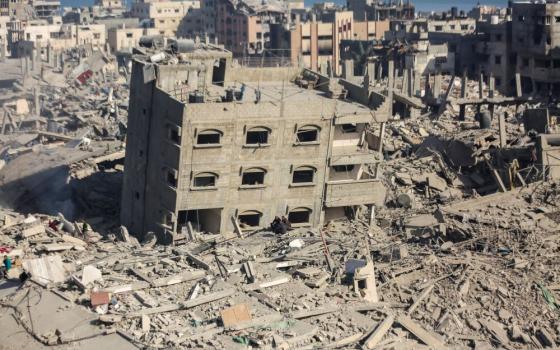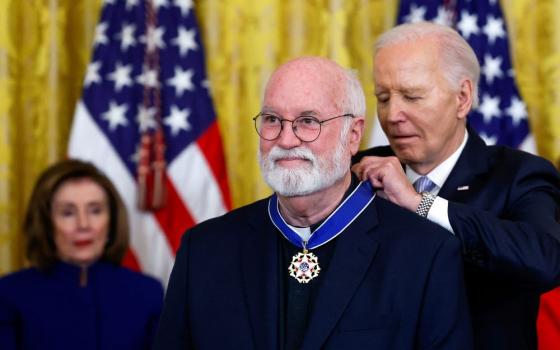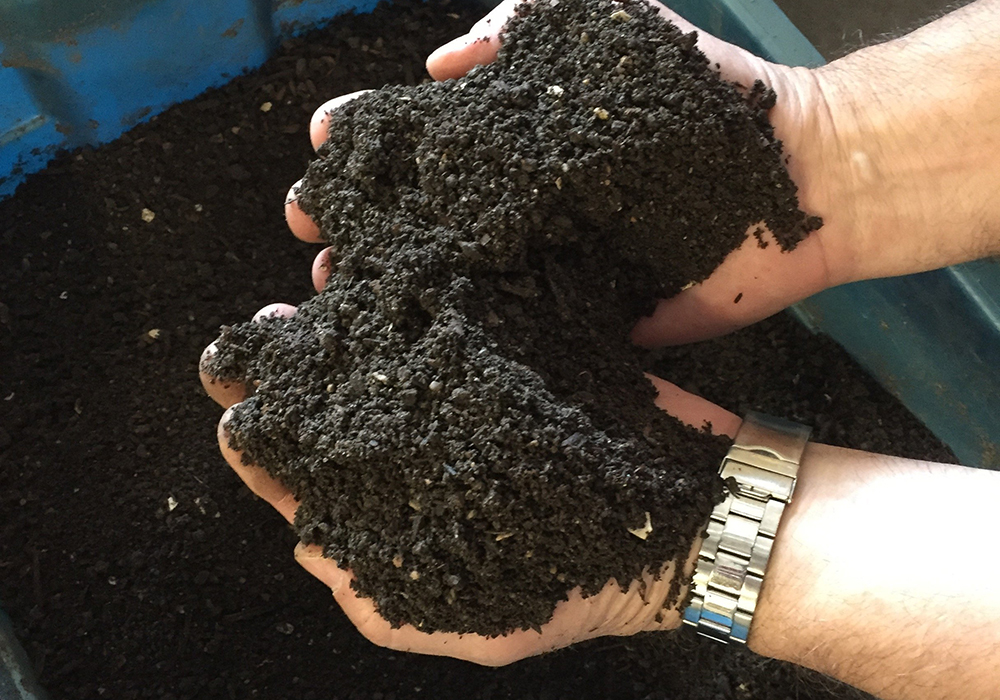
An undated file photo shows a person holding compost in a garden. (OSV News/Courtesy of University of Dayton)
About 40 people from around South Bend, Indiana, gathered at St. Thérèse, Little Flower Catholic Church for a March 9 workshop on composting. Composting was talked about as an ethically responsible and environmentally smart approach for dealing with discarded food and organic waste.
Little Flower's Social Justice Commission organized and promoted the event. Commission members reached out to local churches — Catholic and non-Catholic — and also to community groups and local academic institutions, including the University of Notre Dame. Providing information about composting at home would lead to conversations about local hunger and how to address it.
"What I want to talk about," began Ben Carson, the first workshop speaker, "is what we are wasting when we throw food out, where that food goes, what happens to it, and how we can begin to reduce the amount we throw out." Carson works in the South Bend area as the educator and consultant for the St. Joseph County Solid Waste Management District.
"Approximately 33-40% of the food produced in the world is thrown out before it's ever eaten," Carson said, showing a picture of a rotten orange. "Some of it barely makes it off the farm, ruined perhaps by frost or pest infestations. And some more of that food is spoiled or damaged in transit to markets."
"But home refrigeration and our care of food at home accounts for 31% of the wastage of food in the United States," he said. Studies indicate that Americans typically only eat about 60% of the food that they buy and bring home. When food in American homes goes to waste, it's typically pitched into the trash and ends up in landfills.
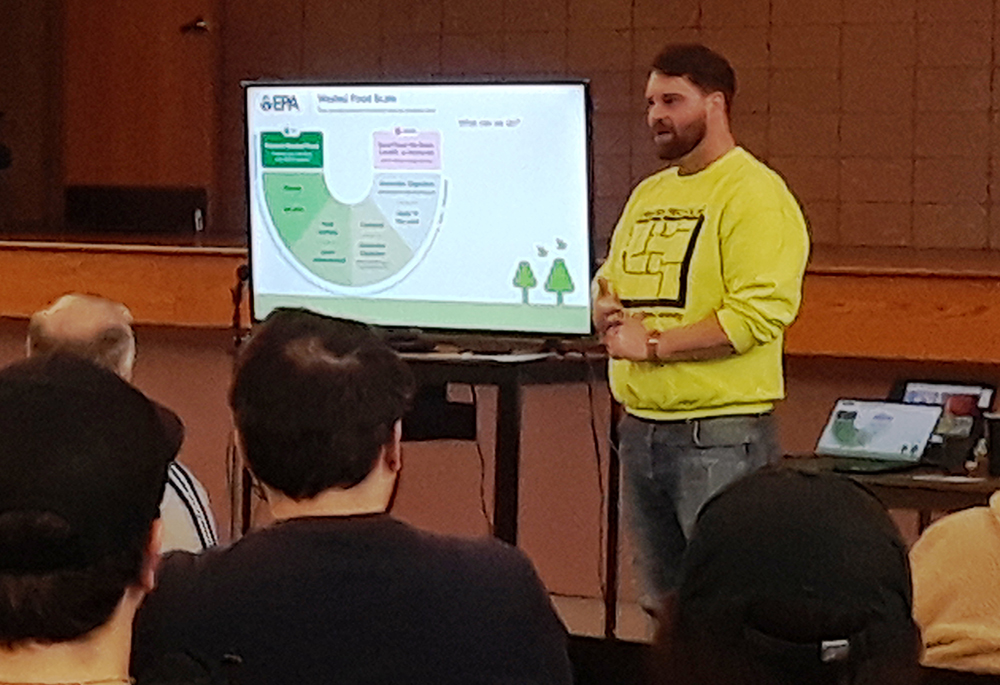
Ben Carson, educator and consultant for the St. Joseph County Solid Waste Management District in Indiana, presents during a composting workshop at St. Thérèse, Little Flower Catholic Church in South Bend, Indiana, on March 9. (Catherine Odell)
Because landfill fields around the U.S. are compacted as they are gradually filled and covered, oxygen is forced out and up. Food and other organic matter in the landfill will decompose, Carson explained, but it decomposes anaerobically — without oxygen.
Methane gas is produced in this anaerobic process, and it rises into the atmosphere. "Fourteen percent of all methane gas produced in the United States comes from municipal waste landfills," he pointed out. "It goes to the top of the atmosphere and traps heat on earth, causing warmer atmospheric conditions. It's like putting a blanket over us! Here in Indiana, we just had our warmest February on record."
He continued slowly, making sure everyone got the point, "Methane can stay in our atmosphere for nine years. That's why we're so concerned about methane."
Brian Will, the second workshop speaker, nodded his head. He agreed with Carson's emphasis on the dangers of methane and global warming. But, he told the group, "I first got involved in the environmental movement because I was very concerned about wildlife."
Will, a member of St. Pius X Catholic Church, a neighboring parish, had worked at the governance level of the Solid Waste Management District in Columbus, Ohio. But his concern about the plight of wildlife prompted him to retire early. He spent time studying and considering environmental issues that needed support and volunteer involvement.
Advertisement
"I wanted to focus on climate change and environmental issues in Indiana," Will explained. "I finally decided that I was going to try to focus on the topic of food waste because that's something that we can all do. Everybody can reduce their food waste and it starts with buying only what we can eat."
"This is really a social justice issue, too," he continued. "When we buy less food and eat what we buy, there's more food available for others. And less food going into the landfill means we will have less toxic waste and methane."
Will said that once he became involved with food waste issues, he learned that 19.1% of children in Indiana are food insecure. "And when you see what's happening in the world," he added, "including the kids so desperate for food who are starving. … It's so tragic. But, in so much of the world, we waste food!"
"We can donate food if we don't use it," Will continued. He talked about the work of Cultivate Food Rescue, a nonprofit organization based in South Bend. This group is devoted to ending the cycle of hunger in northern Indiana and gets donated food from some local groceries and institutions like Notre Dame. Cultivate's staff, along with many volunteers, makes small frozen meals for people facing food scarcity.
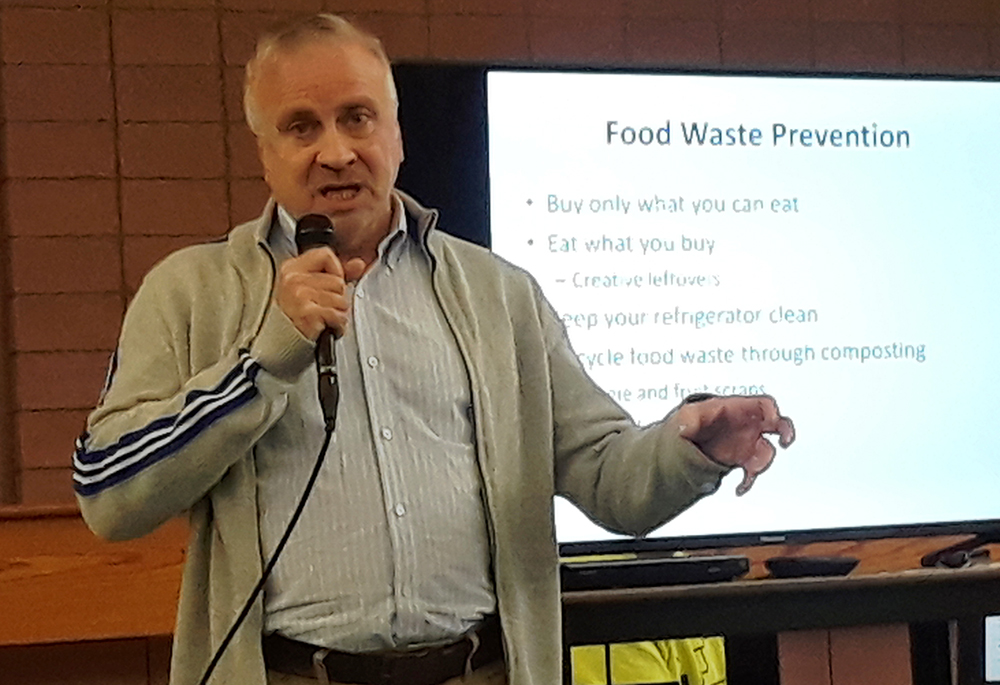
Brian Will presents during a composting workshop at St. Thérèse, Little Flower Catholic Church in South Bend, Indiana, on March 9. Now retired, Will previously worked at the governance level of the Solid Waste Management District in Columbus, Ohio. (Catherine Odell)
Pointing to a variety of new composters at the back of the parish hall that were on display from an area farm supply store, Will reminded everyone that these composters were good investments. "Kitchen countertop composters, when plugged in, will take about two hours to produce the compost," he said. But there's a wide spectrum of composting approaches to choose from. Successful composting can be done with simple, homemade containers and composters.
Even a simple, homemade, outdoor composter that gets the right mix of nitrogen-rich food scraps, carbon-rich elements and attention can produce excellent compost, he promised. In turn, that compost can help nourish plants better than any commercial fertilizer.
A successful compost pile or bin needs about 30% nitrogen-rich items to 70% carbon-rich components. The green or nitrogen-rich components are fruit and veggie scraps along with yard waste items such as grass clippings. The brown or carbon-rich ingredients include brown (dried) leaves, cardboard, newspaper, wood chips, sawdust. "You can even add your junk mail!" he added.
Both Carson and Will encouraged workshop participants to "dig into" composting, even if they start small.








